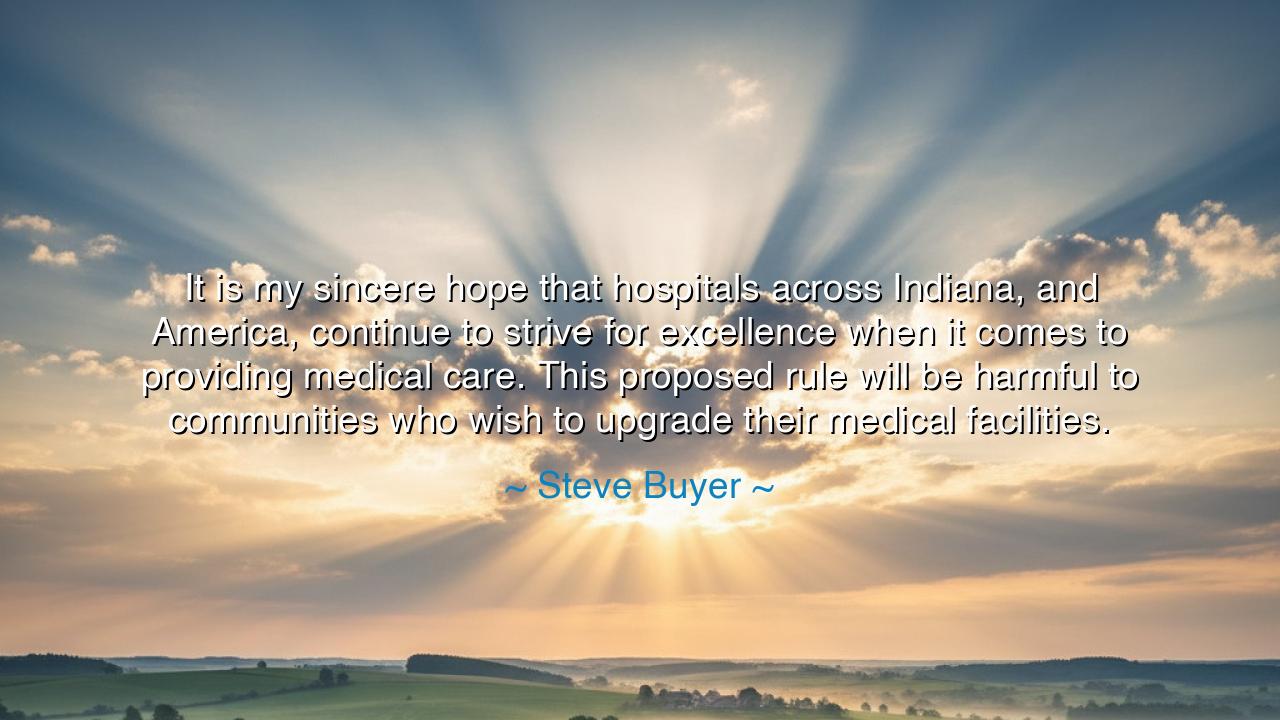
It is my sincere hope that hospitals across Indiana, and America
It is my sincere hope that hospitals across Indiana, and America, continue to strive for excellence when it comes to providing medical care. This proposed rule will be harmful to communities who wish to upgrade their medical facilities.






"It is my sincere hope that hospitals across Indiana, and America, continue to strive for excellence when it comes to providing medical care. This proposed rule will be harmful to communities who wish to upgrade their medical facilities." — Steve Buyer
Hear now the words of Steve Buyer, a voice of stewardship and foresight, who spoke not merely of hospitals and rules, but of the sacred duty to preserve human health. His words, though rooted in policy, carry the weight of timeless wisdom: that the care of the sick and the betterment of healing institutions must never be hindered by law or indifference. When he said, “This proposed rule will be harmful to communities who wish to upgrade their medical facilities,” he warned against complacency — against the unseen dangers that arise when progress is shackled by bureaucracy, when compassion is restrained by regulation. His plea was not political but moral: that the flame of medical excellence must be kept alive in every generation, for upon it depends the life and dignity of the people.
Buyer’s words were spoken in the halls of governance, where decisions that shape the lives of millions are weighed and measured. As a congressman from Indiana, he saw firsthand the challenges faced by rural towns and small communities — places where hospitals stood as both sanctuary and symbol. To him, these were not mere buildings of stone and glass, but temples of mercy, where human skill met divine grace. Yet he saw that when burdensome rules and misguided policies are imposed, the light of healing flickers. His warning was thus both practical and prophetic: if the healers are hindered, the whole community suffers.
This truth is as old as civilization itself. From the temples of Asclepius in ancient Greece to the hospitals founded by monks and physicians in the Middle Ages, societies have risen and fallen upon the strength of their care for the vulnerable. When rulers invested in healing, their nations flourished; when they neglected it, plagues and despair followed. Buyer’s plea is a continuation of that sacred lineage — a reminder that the progress of medicine must never be reduced to mere economics. For the health of a people is the foundation upon which all prosperity stands.
Consider the story of Florence Nightingale, who, during the Crimean War, faced not only disease and death, but the resistance of bureaucracy. When she sought to improve the conditions of the wounded — to bring cleanliness, light, and care into the squalid hospitals of war — she was met with skepticism and obstruction. Yet she persevered, guided by an unshakable conviction that the right to healing is sacred. In the end, her reforms transformed medicine itself, proving that compassion armed with determination can overcome even the most rigid of systems. Buyer’s words resonate in that same spirit — a call to defend progress when it is threatened by indifference or regulation without wisdom.
In the modern age, the challenges are no longer wars of blood, but wars of policy. Hospitals struggle under the weight of compliance and cost; small communities watch their medical centers decay for lack of funding or freedom to modernize. When Buyer speaks of “striving for excellence,” he calls upon both leaders and citizens to take responsibility — to see that excellence is not a luxury, but a duty. To strive for excellence in medicine is to honor life itself, to ensure that every mother, every child, every elder finds safety in their hour of need.
Yet the heart of his message is not confined to hospitals. It speaks to the spirit of progress in all things. For every field of human endeavor — whether science, art, or governance — must beware the chains of complacency. A rule without wisdom is a prison; a policy without compassion is a betrayal. Buyer’s warning, then, is a call to discernment: that laws must serve life, not stifle it; that institutions must evolve, not ossify. He reminds us that excellence is a living thing — it must be nurtured, protected, and renewed through courage and care.
So, O children of tomorrow, let this be your lesson: never allow fear or regulation to silence the voice of progress. Strive for excellence in all that you do — not for pride, but for service. If you are a leader, craft laws that uplift, not hinder. If you are a healer, let your work be guided by both science and compassion. And if you are a citizen, defend those who labor to build and to heal. For as Steve Buyer teaches, the greatness of a nation lies not in its power, but in its care for its people.
In the end, his words stand as both plea and prophecy: that the strength of America — and of any civilization — will be measured not by the might of its armies or the height of its towers, but by the mercy of its hospitals, the wisdom of its leaders, and the commitment of its people to preserve and uplift the sanctity of human life. Let that light of healing never be dimmed, and let all who hear these words carry forward the sacred charge — to keep the flame of excellence in care burning for all generations to come.






AAdministratorAdministrator
Welcome, honored guests. Please leave a comment, we will respond soon